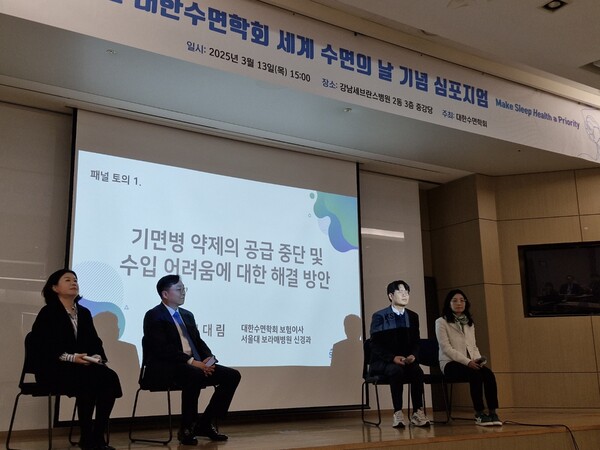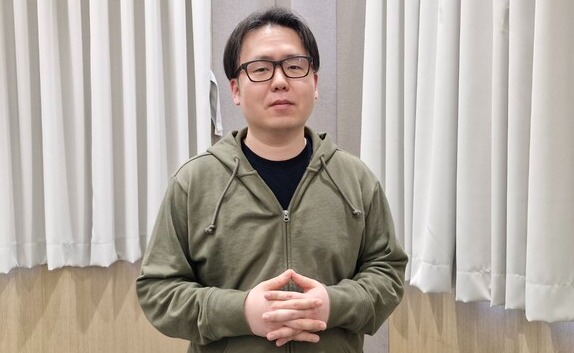Patients with narcolepsy, the only sleep-related disorder classified as a rare disease, are facing challenges as effective medications for the condition are gradually being restricted from prescription.
Wakix (pitolisant), which has been prescribed to patients with narcolepsy, a rare disease, since 2022 for its effectiveness in treating cataplexy and daytime sleepiness, was discontinued in Korea on Sept. 16 of last year, after the drugmaker voluntarily withdrew its license.
Methylphenidate, a treatment for attention deficit hyperactivity disorder (ADHD), has become unavailable for prescription to narcolepsy patients due to stricter regulations on psychotropic drugs.
The Korean Society of Sleep Medicine (KSSM) held a symposium to commemorate World Sleep Day at Gangnam Severance Hospital on March 13 to discuss solutions to the supply disruption and import difficulties of narcolepsy drugs.

The Korean Society of Sleep Medicine (KSSM) held a symposium to commemorate World Sleep Day at Gangnam Severance Hospital on March 13 to discuss solutions to the supply disruption and import difficulties of narcolepsy drugs.
Wakix is a narcolepsy treatment developed by the French pharmaceutical company Bioprojet Pharma and distributed in Korea by Mitsubishi Tanabe Pharma Korea. Unlike traditional stimulant-based treatments, it induces wakefulness by modulating histamine H3 receptors. It is the only drug effective against both daytime sleepiness and narcolepsy simultaneously and has been prescribed to patients who experience side effects from other medications.
However, the drugmaker abandoned the drug supply, citing that the price of the drug in Korea was too low compared to the global market. The company announced its decision to withdraw from the domestic market in April last year, and on Oct. 18 2024, the license was revoked.
Park Chan-soon, a professor of otolaryngology at St. Vincent's Hospital and vice president of the KSSM, said, “It’s difficult that the drug was introduced in 2022 but withdrawn in only two years. What we can do for patients is to have it designated as an exit prevention drug, and if necessary, obtain it through the Korea Orphan and Essential Drug Center.” He added, “The problem is that it is not covered by health insurance, so patients have to pay the full cost.”
“It may be the government's role to ensure that the drug is supplied at the lowest possible price, but it is wrong to cause supply disruptions due to an excessively low price,” Park said.
Worse, some of the drugs that had been effective for treating narcolepsy are no longer available due to the policy change.
The Korean Narcolepsy Patient Association President Lee Han attended the symposium and pointed out that, in addition to Wakix, methylphenidate—a medication for ADHD that had been used until recently—has also been discontinued.

The Korean Narcolepsy Patient Association President Lee Han
“People with narcolepsy take palliative medication, not a cure, and they have fulfilled their tax obligations, national military duties, and responsibilities as citizens, but they are upset that the medications they relied on are no longer available,” Lee said, citing Concerta as an example.
Methylphenidate-based medications are central nervous system stimulants approved for the treatment of attention deficit hyperactivity disorder (ADHD) and narcolepsy. These medications are available in extended-release formulations such as Phenidate and Perospin, as well as enteric-coated extended-release formulations like Concerta, Methadate, Medikinet, and Ritalin.
The recent tightening of controls on narcotics has resulted in these medications being prescribed only to pediatric patients with narcolepsy who also have ADHD.
“If the supply of Wakix is suspended in Korea and patients are prescribed the drug through the Korea Orphan Drug Center, they will have to pay more than 1 million won ($687) a month for a medication that currently costs about 20,000 won,” he said. “Not many patients can afford to pay more than 10 million won a year.”
“We have submitted several complaints to government authorities and the National Assembly, but we have not received any answers,” he said, appealing to the government to show more social consideration.